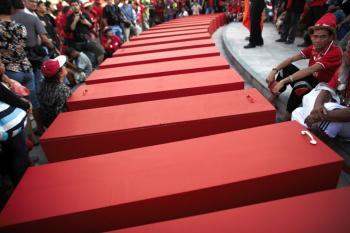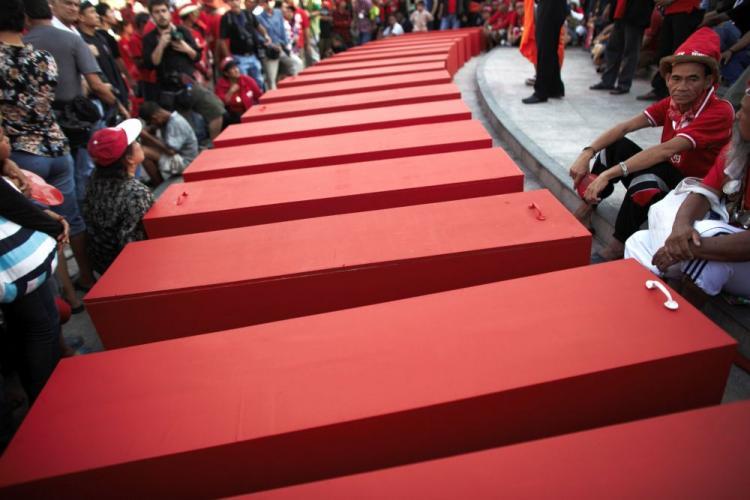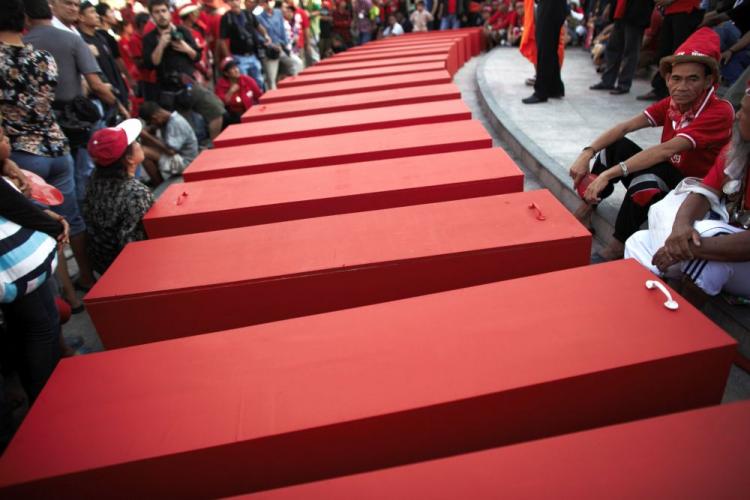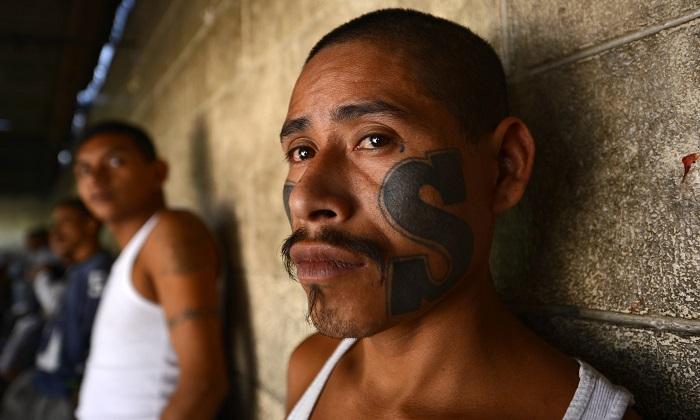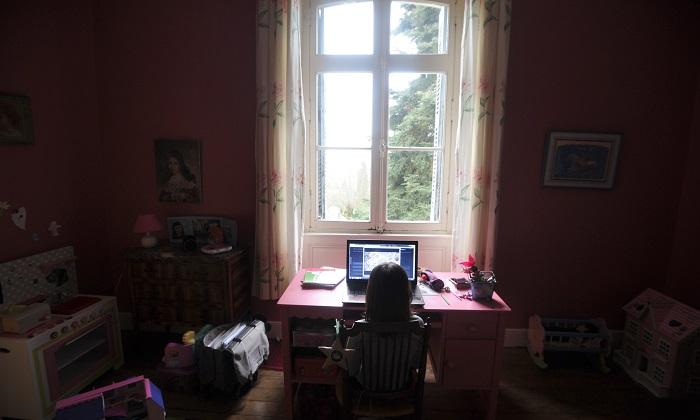BANGKOK, Thailand—“Red shirt” anti-government protesters and Thai military clashed on Saturday in vicious street fighting that has left 21 people dead and at least 858 injured in Bangkok.
Local media has reported that red shirt protesters used military weapons and homemade bombs to repel the military’s attempt to remove them from one of their two rally bases established in the Thai capital.
From 1 p.m. local time, onward the military used batons, tear gas, and fired rubber bullets in their action to clear the protesters from Phan Fah Bridge and Rajdumnoen Road in Bangkok’s historic quarters.
The red shirts have been based there since mid-March and it was there they first made their demands that Thai Prime Minister Abhisit Vejjajiva dissolve Parliament and make way for fresh elections.
After Saturday’s violence, a source inside the ruling Democratic Party said that the government is considering calling early elections—in six months time instead of nine months—in an attempt to break the impasse, reported the Bangkok Post.
The red shirts—formally known as the United Front for Democracy against Dictatorship (UDD)—say Prime Minister Abhisit’s government came to power unlawfully and were installed by the Thai military and the bureaucratic elite.
As Saturday’s street violence escalated into the night the army, media, and the Thai PM, say that the red shirts responded with weapons, which included M79 grenade launchers.
The Bangkok Post reported that red shirts used a gas cylinder as a bomb, which wounded around 50 soldiers, and that gunfire from the red shirt ranks wounded 50-60 soldiers near one intersection.
The newspaper also reported that hand grenades were hurled at soldiers and that the sound of machine gun fire was heard.
A government spokesman stated that a military helicopter flying over the area was fired upon and one soldier was subsequently wounded.
The red shirts have countered government claims by saying the military fired live rounds into their followers.
“The supporters of democracy are very angry about what happened,“ UDD leader Weng Tojirakorn told The Australian. “Soldiers shot people with machine guns and real bullets. That goes against every law, even emergency law.”
After hours of fighting, the army was forced to retreat and TV footage showed the military being overwhelmed near the Democracy Monument by rampaging red shirts.
In their retreat, the military also left behind large amounts of equipment and vehicles.
Among the 20 dead from the clashes, the Bangkok Post reported that five were soldiers and 16 were civilians—one was a Japanese cameraman, Hiro Muramoto, from the Reuters news agency.
Speaking on national TV on Saturday night, Prime Minister Vejjajiva said that the Thai military had strict guidelines on its rules of engagement and could only use their firearms to fire in the air or in self-defense only if their lives were in danger.
Prime Minister Vejjajiva said that the nation will need to investigate the killings and stated that it would be done by an independent body. He offered his condolences to those families who have lost their loved ones.
Saturday’s clashes follow a state of emergency that was declared last Wednesday when the prime minister said that the red shirts could no longer be considered peaceful after they stormed the nation’s Parliament forcing members and ministers to flee.
The government was further embarrassed when the red shirts on Friday overran Thai security and temporarily took back a pro-red shirt TV station that was closed down under the state of emergency.
On Sunday, the protesters held the historic quarters and their other base situated in the Siam commercial district and also held ceremonies for their dead. Four captured soldiers were also released by the red shirts. The soldiers said they were treated well.
The red shirts are a loose coalition of supporters of the fugitive former Prime Minister Thaksin Shinawatra, pro-democracy activists and ex-communists.
Thaksin has been addressing the protesters by video link on a regular basis from overseas. The former PM is a billionaire businessman living in self-imposed exile to avoid corruption charges related to his time in office as prime minister. His government was ousted by a military coup in 2006.
Local media has reported that red shirt protesters used military weapons and homemade bombs to repel the military’s attempt to remove them from one of their two rally bases established in the Thai capital.
From 1 p.m. local time, onward the military used batons, tear gas, and fired rubber bullets in their action to clear the protesters from Phan Fah Bridge and Rajdumnoen Road in Bangkok’s historic quarters.
The red shirts have been based there since mid-March and it was there they first made their demands that Thai Prime Minister Abhisit Vejjajiva dissolve Parliament and make way for fresh elections.
After Saturday’s violence, a source inside the ruling Democratic Party said that the government is considering calling early elections—in six months time instead of nine months—in an attempt to break the impasse, reported the Bangkok Post.
The red shirts—formally known as the United Front for Democracy against Dictatorship (UDD)—say Prime Minister Abhisit’s government came to power unlawfully and were installed by the Thai military and the bureaucratic elite.
As Saturday’s street violence escalated into the night the army, media, and the Thai PM, say that the red shirts responded with weapons, which included M79 grenade launchers.
The Bangkok Post reported that red shirts used a gas cylinder as a bomb, which wounded around 50 soldiers, and that gunfire from the red shirt ranks wounded 50-60 soldiers near one intersection.
The newspaper also reported that hand grenades were hurled at soldiers and that the sound of machine gun fire was heard.
A government spokesman stated that a military helicopter flying over the area was fired upon and one soldier was subsequently wounded.
The red shirts have countered government claims by saying the military fired live rounds into their followers.
“The supporters of democracy are very angry about what happened,“ UDD leader Weng Tojirakorn told The Australian. “Soldiers shot people with machine guns and real bullets. That goes against every law, even emergency law.”
After hours of fighting, the army was forced to retreat and TV footage showed the military being overwhelmed near the Democracy Monument by rampaging red shirts.
In their retreat, the military also left behind large amounts of equipment and vehicles.
Among the 20 dead from the clashes, the Bangkok Post reported that five were soldiers and 16 were civilians—one was a Japanese cameraman, Hiro Muramoto, from the Reuters news agency.
Speaking on national TV on Saturday night, Prime Minister Vejjajiva said that the Thai military had strict guidelines on its rules of engagement and could only use their firearms to fire in the air or in self-defense only if their lives were in danger.
Prime Minister Vejjajiva said that the nation will need to investigate the killings and stated that it would be done by an independent body. He offered his condolences to those families who have lost their loved ones.
Saturday’s clashes follow a state of emergency that was declared last Wednesday when the prime minister said that the red shirts could no longer be considered peaceful after they stormed the nation’s Parliament forcing members and ministers to flee.
The government was further embarrassed when the red shirts on Friday overran Thai security and temporarily took back a pro-red shirt TV station that was closed down under the state of emergency.
On Sunday, the protesters held the historic quarters and their other base situated in the Siam commercial district and also held ceremonies for their dead. Four captured soldiers were also released by the red shirts. The soldiers said they were treated well.
The red shirts are a loose coalition of supporters of the fugitive former Prime Minister Thaksin Shinawatra, pro-democracy activists and ex-communists.
Thaksin has been addressing the protesters by video link on a regular basis from overseas. The former PM is a billionaire businessman living in self-imposed exile to avoid corruption charges related to his time in office as prime minister. His government was ousted by a military coup in 2006.
